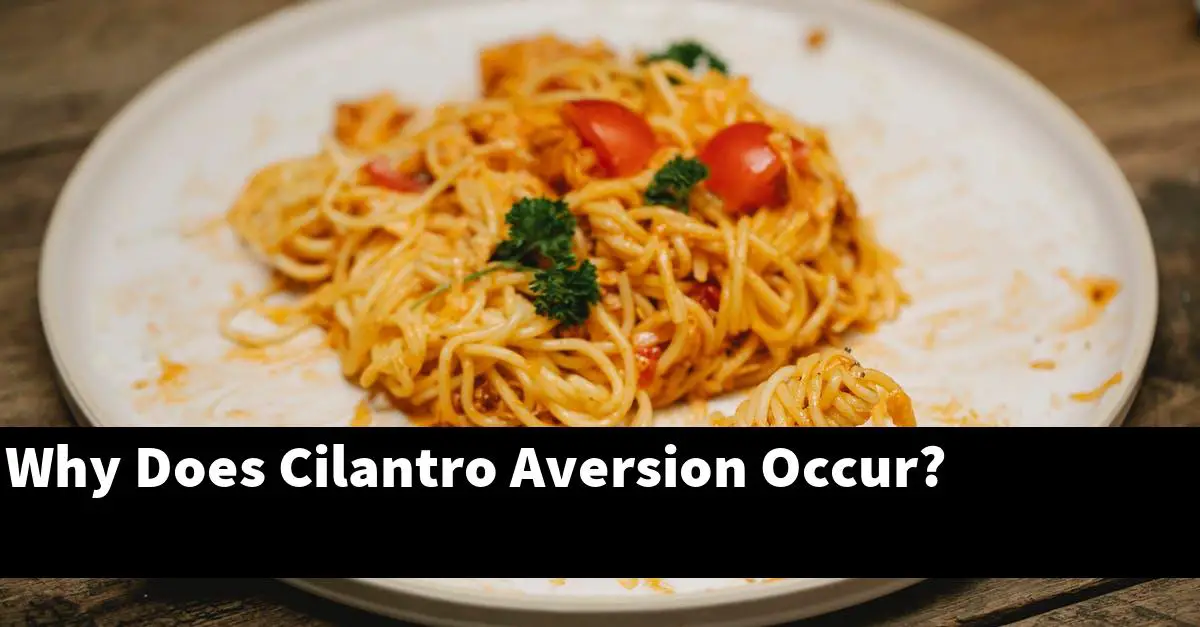Cilantro aversion is a phenomenon where people have a strong dislike for the taste of cilantro. Some people may even experience nausea or vomiting when they eat cilantro.
The aversion can be caused by genetic factors, as well as exposure to certain chemicals in cilantro.
What is the cilantro taste aversion trait?
The cilantro taste aversion trait is a preference for foods that do not have a strong cilantro taste.
Why do i suddenly hate cilantro?
Cilantro is a member of the cabbage family and can be found in most grocery stores. It has a strong flavor and can be used in a variety of dishes.
Some people may not like the strong flavor of cilantro, which can cause them to dislike the herb.
Why does cilantro taste like soap?
Cilantro (Coriandrum sativum) contains an enzyme, lauroyl lysine acetyltransferase (LALAT), which catalyzes the acetylation of lysine residues in aromatic compounds, including terpenes and essential oils. This reaction produces the characteristic soap-like odor and taste of cilantro.
Why are some people afraid of cilantro?
Cilantro (Coriander) is a member of the parsley family and is used as a spice and flavor in many dishes. It can be a little bit spicy for some people, especially if it is not used in moderation.
Some people may be afraid of cilantro because it is not well known and it can be a little bit confusing to identify it in a dish.
Can you get over a cilantro aversion?
There is no surefire answer, but some things that may help include trying different varieties, cooking with it in different ways, or pairing it with other spices that you are more open to. Additionally, it may be helpful to talk about your aversion with a trusted friend or therapist in order to gain some insight and understanding.
Ultimately, overcoming a cilantro aversion takes time and patience, and there is no guarantee that it will work for everyone.
How to make cilantro not taste like soap?
There are a few ways to make cilantro not taste like soap. One way is to rinse the cilantro thoroughly before using it.
Another way is to mix the cilantro with other herbs or spices before using it. One final way is to store cilantro in an airtight container in the refrigerator, where it will keep for several days.
What percentage of people have cilantro aversion?
There is no scientific consensus on what percentage of people have cilantro aversion, but anecdotal evidence suggests that it is a common problem. Some people find cilantro to be overwhelmingly unpleasant, while others cannot stand the smell or taste of cilantro.
Some people may have cilantro aversion due to personal sensitivities or allergies, while others may find the herb to be in conflict with their dietary preferences.
Is the cilantro gene dominant or recessive?
The cilantro gene is dominant.
What is cilantro supposed to taste like?
Cilantro is a herbaceous green plant in the family Lamiaceae. It is usually considered to be an aromatic, spicy, and tangy herb.
The leaves and flowering stems are used in various cuisines, mostly as a flavoring agent for dishes such as salsas, soups, and sauces.
Why does cilantro make my guacamole taste bad?
Cilantro is a member of the parsley family and has a flavor that can overpower other ingredients in guacamole. The compound called thymol, which cilantro contains, can cause the flavor of other ingredients to become bitter.
What gene makes people hate cilantro?
There is no one gene that makes people hate cilantro. However, there are some genetic factors that can increase the chances someone will dislike cilantro.
For example, people who have a gene that makes them less sensitive to bitterness may find cilantro too bland. Additionally, people who have a gene that makes them more sensitive to sensory stimuli, such as smell and taste, may also find cilantro unpleasant.
In Summary
The article discusses research on cilantro aversion and why it may occur. Some scientists believe that cilantro aversion is genetic, while others believe that it may be due to environmental factors.
However, the exact cause of cilantro aversion is still unknown.

